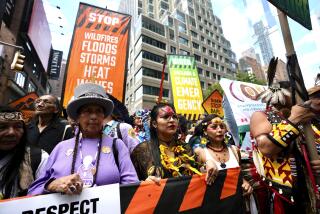Peaceful Protests Upstage U.N. Summit
- Share via
JOHANNESBURG, South Africa — As many as 10,000 protesters marched Saturday from a shantytown five miles away to the plush suburban site of the U.N. environmental summit here in a peaceful demonstration against globalization and other concerns, hurling slogans and leaflets at journalists rather than rocks at police.
But demonstrators who had walked from the township of Alexandra were confronted first by a phalanx of television cameras and then forced to halt well outside the conference venue by concrete barricades, razor wire and one of the largest assemblies of police in this country since the end of apartheid.
The marches were the biggest scheduled for a summit that is expected to draw more than 100 heads of state and government to forge plans aimed at reducing poverty while protecting the planet. For a day, diplomatic haggling within the gathering was upstaged by colorful street theater without: red-shirted demonstrators waving flags and banners in front of a blue line of police in riot gear.
“Those fat cats inside the convention center do not speak for us,” shouted one leader through a bullhorn. “They are the exploiters. They take over our electricity. They take over our water. Today, we must fight repression ... George Bush and all of the capitalist leaders of the world.”
Henriette Bester, a director of the Gauteng provincial police, said Saturday’s three permitted marches came off without serious incident, except that one protester suffered a heart attack.
“We planned for the worst,” Bester said in explaining the enormous show of force, which included police dogs, helicopters and mounted patrols plus the line of officers with riot shields.
South African authorities have brought in 8,000 police from surrounding provinces to bolster 19,000 in Johannesburg and establish a wide perimeter around the convention center in the ritzy suburb of Sandton, which will begin to receive world leaders today and Monday. President Bush will not attend.
The authorities wanted to make sure that the 10-day World Summit on Sustainable Development, which ends Wednesday, did not fall victim to the kind of anti-globalization protests that disrupted the 1999 World Trade Organization meeting in Seattle or the pro-Palestinian demonstrations that marred the conference on racism last year in Durban, South Africa.
On Saturday, members of Greenpeace and other environmental groups marched in solidarity with the more moderate of the South African demonstrators.
“While we support the issues, we do not support disrupting the summit,” said Michael Strauss, a spokesman for a coalition of environmental and social activist groups. “This is not supposed to be Seattle or Durban. We don’t want the [Bush] administration to say, ‘See, these conferences don’t work.’ This is the one constructive forum we’ve got, and we want the world leaders to have a chance to do the right thing.”
Most of the marchers seemed focused on anti-globalization and pro-Palestinian efforts.
“Comrades, it’s quite clear a new movement has arrived to South Africa: anti-globalization,” shouted one speaker in a red T-shirt. “It’s the rich. They want their hands on the oil of Angola. They want their hands on the diamonds of the Congo, and they want their hands on the copper of Zambia.”
Some South African Muslims marched carrying Palestinian flags and wearing T-shirts emblazoned with anti-Israel, anti-Zionist slogans.
Iqbal Jassat, one Muslim marcher, was present when the Palestinian Solidarity Committee disrupted a presentation on reforestation last week by the Jewish National Fund. He said more such action is likely when Israeli Foreign Minister Shimon Peres arrives this week.
“I suppose he can expect a hot reception,” Jassat said.
Other demonstrators Saturday focused on a rainbow of issues, ranging from barring U.S. food relief that includes genetically modified corn to both supporting and opposing South Africa’s ruling party, the African National Congress, and President Robert Mugabe of neighboring Zimbabwe.
Some members of the Landless People’s Movement lauded Mugabe’s seizures of land from white farmers, which has brought him international notoriety.
“You are a lion, Mugabe, you are a lion,” they chanted in the Zulu language. “You are a hero, Mugabe, you are a hero. The land must be taken.”
But one speaker later corrected the marchers.
“We do not support Robert Mugabe ... because he is a dictator, he kills people in Zimbabwe. He does not allow free speech.”
More to Read
Sign up for Essential California
The most important California stories and recommendations in your inbox every morning.
You may occasionally receive promotional content from the Los Angeles Times.










